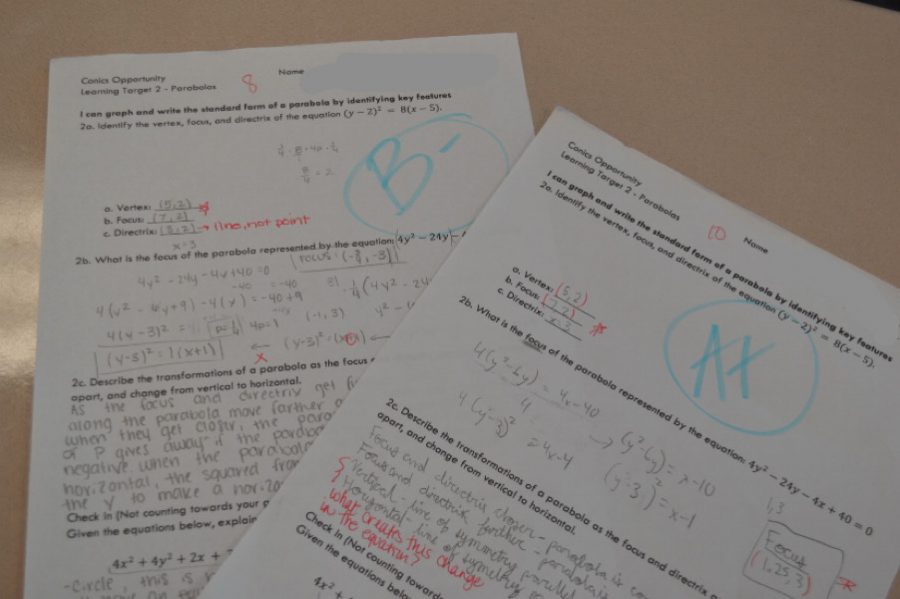Redefining success: Shifting from competition to personal growth in the classroom
It is another AP US History test day in class, and I am not even dreading the test. I dread the time afterward. I begin the test with confidence, ready to assess each question as it is given to me, but then after I get it back, I quickly slouch in my chair when I see that I scored 36%. I begin to think about the question that I am going to hear from each one of my friends: “What’d you get on the test?” Knowing that I am a horrible test-taker because I am constantly second-guessing myself, I hate telling my friends what I get on tests.
My best friend has the ability to take tests with ease and always scores highly, so when he meets me in the hallway after the test, he wants to know my score. I am reluctant to tell him because I am upset with my score, and I am not feeling too high on myself. As he tries to rip my test score off of my tongue, he blurts out that he scored 70%. After I compared our test scores in my head, I am left feeling upset with myself and the feeling of being utterly stupid swarms in my head.
It seems to me that academic competition between peers has nothing but a negative effect. The idea that competition is good does not make sense when there are teachers and peers that encourage students to feel disgraced after they do not perform well on a test. It seems clear that students who let their competitive nature get the best of them ruin the classroom environment for others.
Being in high school, I have noticed my own personal desires and confidence disappear when school morphs into a competition. I constantly worry about how I can apply myself to my environment in an attempt to figure out a way to become number one out of all my friends.
The constant pressure to always prove that one is the smartest in the classroom affects the personal motivation of many other high school students. Students have their own special talents and personal characteristics. With these factors in mind, understanding how each kid is affected in a competitive school environment becomes increasingly important.
Students constantly comparing grades, pushing to be the first one to finish an assignment, and fighting for the number one test grade all help to create the type of competitive sense in the classroom. The constant pressure to always prove that students are more perfect than their peers can completely destroy motivation.
Senior Emily Burg comments on this competition: “It’s difficult to focus more on the learning aspect of school when the only thing of importance is how high your test score is or what grade you have in the class,”
When students apply themselves, it means that they put forth an effort to better their lives. However, in their everyday lives, when students learn how to apply themselves, they create a positive contribution to society around them. Although, when students are being pressured to feel the need to be number one in thecompetitive classroom arena by their peers, students are not bettering themselves.
John Shindler, a Professor at California State University, Los Angeles in the Department of Curriculum and Instruction…, provides insight into how competition in the classroom affects students through his Transformative Classroom Management research.
According to Shindler, students put pressure on themselves to always be number one, which can establish a fear of failure, damage self-esteem, and self-worth. The heavy emphasis on winning can destroy the aspect of teamwork, and students’ perceptions of their teacher may alter in a negative manner.
Junior Olivia Haddock explains her experiences wiht peer competition within a school environment, saying, “Yes I do feel pressured to be academically better than my friends, especially when we share grades on the same test.”
With every student pursuing personal achievements, it introduces the idea of what it truly means to do the most. This idea destroys the concept of what it means to apply oneself academically. By removing competition with friends and introducing the idea of how all students learn for themselves, it furthers the concept that will help every student to be better. This idea of students learning how to focus on themselves is the definition of what it means to do the most.
Senior Erin Ochs elaborates, “I think it means doing the most to your own personal ability. Push for you, not for others.”
Students can identify their own personal knowledge of what it means to do the most for themselves to help remove competition in the classroom, but the teacher can also help improve the classroom environment. When students understand their own strengths, they help the process of destroying a competitive classroom.
If students worked on themselves and what they needed to do to improve their personal academic performance, they would help to remove the overarching idea of always needing to be number one. When they allow themselves to improve to the best of their own personal ability, they are doing the most for themselves.
According to Shindler, teachers can remove incentives for winning, make learning and fun the goal for each individual student and use the classroom as a way to reinforce existing knowledge and less of a way to see who can learn faster than the rest.
“When a student sees his/her school performance as a contest, it leads increasingly to a helpless pattern…[this] develops through perception of himself/herself as having a fixed quantity of ability. This incites the need to prove adequacy relative to others. While on the surface it may appear that students are motivated to perform it is rather an evidence of motivation to avoid the pain of feeling inadequate and inferior,” says Shindler.
When students learn what it means to do the most for themselves, it helps their understanding of their personal strengths and the way that they work. When they learn how they function in this capacity, it takes away all of the pressure of wanting to be top dog in the classroom, and the window for personal desires and confidence opens.
Ella Crust, a senior at A-West, says doing the most for herself is liberating: “What it means to do the most is to put everything you have into something you love with no fear of what may happen.”
The battle of kids focusing less on their friends’ scores and more on how to extend their learning will be difficult for anyone to overcome, but once students ask themselves what it means to do the most in their daily lives, they begin to understand how they function and how to be the best version of their own being. It is time for schools to rethink the classroom environment to remove competition and focus on what it means to fully obtain knowledge for every single student. It is time for teachers to work with their students to create an environment of self-esteem and confidence. And, it is time for students to focus on themselves and less of their peers.

Amelie Bauer is a senior at A-West who enjoys running, mountain biking, and spending time with friends and family in her free time.



